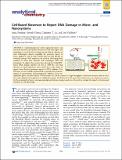Cell-Based Biosensor to Report DNA Damage in Micro- and Nanosystems
Author(s)
Fendyur, Anna; Varma, Sarvesh; Lo, Catherine T.; Voldman, Joel
DownloadVoldman_Cell-based.pdf (3.741Mb)
PUBLISHER_POLICY
Publisher Policy
Article is made available in accordance with the publisher's policy and may be subject to US copyright law. Please refer to the publisher's site for terms of use.
Terms of use
Metadata
Show full item recordAbstract
Understanding how newly engineered micro- and nanoscale materials and systems that interact with cells impact cell physiology is crucial for the development and ultimate adoption of such technologies. Reports regarding the genotoxic impact of forces applied to cells in such systems that can both directly or indirectly damage DNA emphasize the need for developing facile methods to assess how materials and technologies affect cell physiology. To address this need we have developed a TurboRFP-based DNA damage reporter cell line in NIH-3T3 cells that fluoresce to report genotoxic stress caused by a wide variety of agents, from chemical genotoxic agents to UV-C radiation. Our biosensor was successfully implemented in reporting the genotoxic impact of nanomaterials, demonstrating the ability to assess size dependent geno- and cyto-toxicity. The biosensor cells can be assayed in a high throughput, noninvasive manner, with no need for overly sophisticated equipment or additional reagents. We believe that this open-source biosensor is an important resource for the community of micro- and nanomaterials and systems designers and users who wish to evaluate the impact of systems and materials on cell physiology.
Date issued
2014-07Department
Massachusetts Institute of Technology. Department of Electrical Engineering and Computer ScienceJournal
Analytical Chemistry
Publisher
American Chemical Society (ACS)
Citation
Fendyur, Anna, Sarvesh Varma, Catherine T. Lo, and Joel Voldman. “Cell-Based Biosensor to Report DNA Damage in Micro- and Nanosystems.” Analytical Chemistry 86, no. 15 (August 5, 2014): 7598–7605.
Version: Author's final manuscript
ISSN
0003-2700
1520-6882